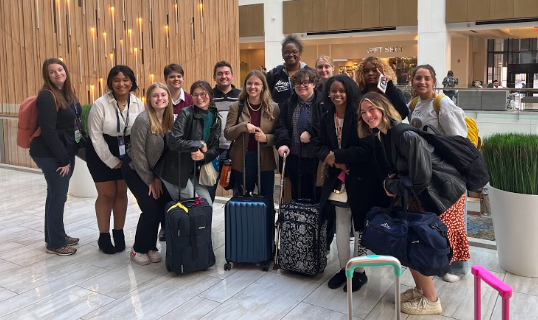Last week, I attended the amazing MediaFest22 journalism conference with my fellow BGSU Society for Professional Journalists chapter members. MediaFest was a five day conference from Oct. 26 to 30.
I was relieved to find out from listening to dozens of professionals over several days that I do not have to have everything figured out for my career before I graduate. I think many college students, like me, see their future as a big question mark, which leads to uncertainty instead of excitement.
Professionals that I grew up watching on 60 Minutes like Bill Whittaker did not have any journalism experience before starting at a TV station and worked his way up. At his keynote speech on Oct. 29, he argued that his history degree helped him the most in journalism because he could contextualize current events with that knowledge.
One of my favorite things about the conference was its diversity. I got to hear from a journalist who is a citizen of the Navajo Nation, Pauly Denetclaw, who focuses on covering news in her community and uplifting indigenous journalists. Her speech was one of the most interesting and inspiring discussions that I listened to during the conference.
While at MediaFest, I also got to hear from Ukrainian journalists documenting the life of civilians and the military on the front lines, John Quiñones’ reflections on documenting migrant workers and undocumented laborers and many other fascinating stories. I felt that the diversity of the panels, the professionals and the student journalists at MediaFest gave me lessons on storytelling in a way that a classroom cannot convey.
Another positive note about career trends that I observed is an increase in professional discussion about mental health and taking breaks every day to prioritize your health.
However, the most prevalent discussion that permeated the conference rooms at Media Fest was the decline of American democracy. This was the rawest, most unfiltered aspect of the conference, particularly as journalists like Bob Woodward reflected on their past and current coverage of American politics.
Woodward’s reflection and takeaways of the several hours of exclusive interviews with the former president Donald Trump, were particularly illuminating and deeply troubling to me. If you are wondering, yes, meeting Carl Bernstein in person is truly a highlight of my life.
Journalists, new and experienced, echoed fears of censorship, fears of rights being taken away and the rise of misinformation threatening our democracy. I observed this trend as I listened to fellow college students discussing being censored by their own universities and unable to talk to student athletes or certain faculty members, to professional journalists fearing the spread of misinformation.
Overall, I felt that MediaFest was a true representation of the future direction of journalism, which is focused on bringing stories that represent more communities than ever before while also combating the spread of misinformation by civilians and politicians alike.








